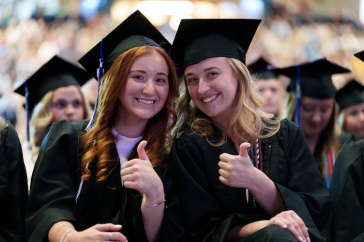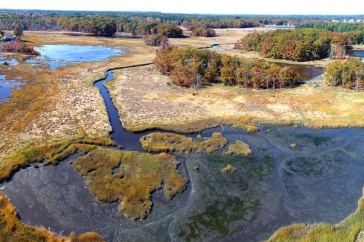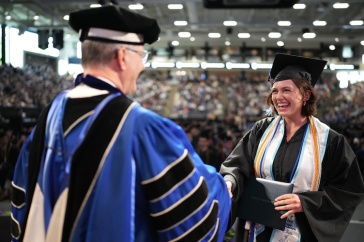
2019-2020 Dissertation Year Fellows at the 2019 Graduate Research Conference
The dissertation. A four-syllable word that signifies years of classes, research, field work, and of course, writing.
From the outside, this can seem like a pretty daunting task, especially for an already-busy graduate student to accomplish. However, when it comes to the dissertation, nobody walks alone. And here at UNH, PhD candidates (and graduate students overall) have a variety of community resources to lean on as they complete their degrees.
In addition to writing, research, and community support, the UNH Graduate School provides funding each year to a selection of PhD candidates in the form of the Dissertation Year Fellowship (DYF). The DYF provides the same funding that one would receive on an assistantship, minus the assistantship responsibilities. Thus, the gift of the DYF is time—time to visit faraway archives, time to learn cutting-edge research tools, and time to write.
So how are the Dissertation Year Fellows using their time? We spoke to five current DYF recipients to get the low-down.
What are you researching?
Lila Teeters, History: My dissertation traces the arguments for and against Native American citizenship in the United States in the late 19th and early 20th centuries. I am focusing on the Native activists who led these debates, and I argue that their work challenged and changed broader conceptions of what it meant to be a U.S. citizen.
Dalton Marsh, Mathematics Education: My research aims to better understand how different attitudes towards mathematics affect high schoolers’ decision to major in science, technology, engineering, and mathematics (STEM) fields.
Heather Grybas, Natural Resources & Earth Systems Science: My dissertation research focuses on two general areas, methodology testing with unmanned aerial systems (UAS, otherwise known as drones) and then applying the technology for understanding forest edge environments.
Himadri Basu, Electrical & Computer Engineering: My dissertation aims to study the essence of synchronized collective behavior in biological systems (such as flocks of birds or schools of fish) and develop mathematical algorithms to recreate such behavior for engineering applications.
Danielle Lavendier-Vitrano, English: My dissertation focuses on the rhetoric of the body—in other words, what do the bodies we inhabit communicate to those around us and how? By analyzing extensive interviews with teachers who identify as fat, I will work to challenge and enrich existing notions of having a body "out of bounds" in the university, and to explore the connections between teaching, learning, and the body.
What has the DYF allowed you to do this year?
Teeters: My research takes me to small archives in local communities to the National Archives and the records of international governing bodies. […] The DYF has allowed me to take numerous longer-term research trips that would be nearly impossible to coordinate if I were teaching classes. I spent time in Washington, D.C. and Boston, and I am planning trips to Santa Fe, Albany, and Ottawa. I have been able to strike a more manageable balance between caring for my family, writing my dissertation, and keeping my eye on the job market.
Grybas: UAS flying is typically done in the middle of the day and preferably when the weather is decent, so I had limitations on when I could collect my UAS data. When I was on my teaching assistantship, I didn’t have as much flexibility as I would have liked for data collection. The DYF has opened up my time substantially and I have been able to collect much of the data I needed to collect while the school year is in session.
Marsh: The time I would have spent with my teaching responsibilities is allowing me to do a deeper dive into my research—answer other questions of interest and pursue advanced statistical methods. Without the support of the DYF, I would likely have had to settle for acceptable statistical methods instead of learning new cutting-edge methods that I am applying.
What UNH community resources do you rely on most?
Teeters: I'm a huge fan of the Connors Writing Center.
Grybas: Attend the UNH Grad School Writing retreats or maybe form your own within your department!
Basu: I feel grateful for on-campus resources such as the weekly robotics seminars, resume review workshops and career counseling [through CaPS], and the library facility. Besides these, events like the career fair, the Graduate Research Conference (GRC), and the 3-Minute Thesis (3MT) presentation provide an excellent opportunity to connect with other research scholars and industry professionals.
How do you approach self-care?
Lavendier-Vitrano: Self-care is super important to me, because it's one of the only things that allows me to be truly present for my friends and family. There are a lot of things I can go without, but sleep and time to myself are two things I've realized I need to prioritize. […] I think a lot about how some people don't think they deserve to care for themselves, and how grad students can easily fall into this way of thinking—grad school is supposed to leave us exhausted and empty right? So, if we're rested and have lives outside of our work, are we doing "it" right? Yes, yes, we are.
Marsh: Honestly, what has worked for me is coming into the gym in the mornings. It really helps to get me going early in the day and I have found that, like scientists say, it helps to spark ideas and think clearer.
Teeters: I try to think as graduate school as my job and not my life. Regular exercise, yoga, and meditation help me stay as grounded as possible, though my four-year-old has some tried and tested ways of distracting me from my research!
Do you have any advice for students working on their dissertation or thesis?
Grybas: You don’t have to do all this alone, surround yourself with people whose opinions you trust. If you’re like me and you over-think everything until you’re at the point of throwing your computer out the window (I strongly suggest not doing that, laptops are expensive right now), talking with a trusted professor can really bring you back down to earth.
Teeters: I recommend reading Bird by Bird by Anne Lamott, How to Write a Lot by Paul J. Silvia, and Eat that Frog! by Brian Tracy. I keep a writing record, too, which helps me track progress (for better or for worse).
Basu: From my advisor, seniors and other fellow lab mates, I received the following suggestions which are worth remembering during the dissertation stage. The first task should be to start writing the first draft of the dissertation early and have it reviewed by your advisor. Next, choose your dissertation committee wisely and start preparing for the questions that they may anticipate from the research expertise of the committee members. Also, you should use a bibliography management software (such as Mendeley) to save all the cited reference papers at one place.
Applications for the 2020-2021 Dissertation Year Fellowships are currently open until January 2, 2020. For more information and application instructions, please visit the Graduate School's Fellowships and Awards page.
-
Written By:
Lily Greenberg '21G | Grad School
















































